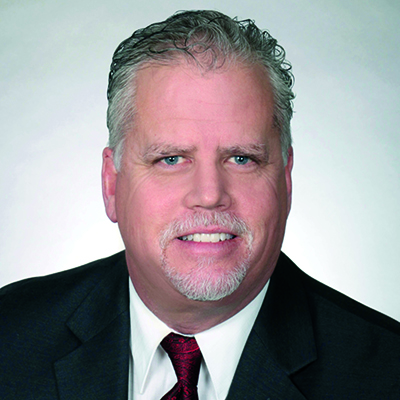Aug 25 | 2020
SC&RA: Operating Through and Around Unautomated States Adds Up to 80% in Costs
.jpg)
While Covid-19 has greatly impacted global supply chains and the transportation industry, for oversized/overweight truckers, there are remnants of silver linings, despite facing unique challenges.
However, the needed push towards digitizing shipping functions due to the pandemic, has also exposed bottlenecks, and documenting and permitting issues for motor carriers, industry leaders said recently.
 “Despite the doom-and-gloom from some transportation industry pundits, ours has not been so bad. It’s looking more and more upbeat,” said Steven Todd, vice president, transportation, at Specialized Carrier & Rigging Association, or SC&RA, during a video presentation to the U.S. Exporters Competitive Maritime Council, Aug. 19, hosted by Breakbulk Events & Media as part of its Breakbulk365 program.
“Despite the doom-and-gloom from some transportation industry pundits, ours has not been so bad. It’s looking more and more upbeat,” said Steven Todd, vice president, transportation, at Specialized Carrier & Rigging Association, or SC&RA, during a video presentation to the U.S. Exporters Competitive Maritime Council, Aug. 19, hosted by Breakbulk Events & Media as part of its Breakbulk365 program.Still Recovering
While maintaining an upbeat outlook, Todd admitted that at the beginning of the pandemic in the U.S. starting in February, “the transportation industry took a sizeable hit, one we’re still recovering from.”
SC&RA is an international trade association of more than 1,300 members from 46 nations, who are involved in North America specialized transportation, machinery moving and erecting, industrial maintenance, millwrighting and crane and rigging operations, manufacturing and rental. Todd said SCR&A members move more than 10,000 oversize/overweight permit loads daily in North America.
The organization was one of the first trade groups to be officially designated by the U.S. Department of Homeland Security as a critical and essential industry.
“Some may think that’s just words only. But, I can tell you from members’ standpoint that it had a tremendous effect in keeping a lot of them from having to close doors early on,” Todd said.
For SC&RA member trucking carriers, the first few months brought “panic and chaos,” he admitted. These included truck drivers “in multiple numbers showing up in loading and unloading zones and finding no one home. This led to many dead-head miles.”
Perhaps better publicized in the early days of the pandemic, motor carriers also experienced difficulties on the road including rest areas, restaurants and truck stops closed.
“While we’re not back to normal, things are as normal as they can be,” Todd added
Are You Automated?
With the onset of the pandemic, vast portions of the shipping industry resorted to remote operations, which exacerbated inland transport, particularly for oversized, overweight shipments, due to the reams of permitting and approvals such unique shipments require to move within North America.
 For Tony Stroncheck, chairman and co-founder of ProMiles Software Development Corp., along with partner Tim Pilcher, their Texas-based regulatory compliance technology platform has been a competitive advantage for carriers and most U.S. markets. Though, in those areas where automated compliance is not as accepted, ProMiles and SCR&A have been forced to creatively support members and clients.
For Tony Stroncheck, chairman and co-founder of ProMiles Software Development Corp., along with partner Tim Pilcher, their Texas-based regulatory compliance technology platform has been a competitive advantage for carriers and most U.S. markets. Though, in those areas where automated compliance is not as accepted, ProMiles and SCR&A have been forced to creatively support members and clients.Stroncheck said ProMiles went on “Covid vacation March 9. We’ve been remote ever since.” It has about 155 employees in four locations.
ProMiles Software has filed thousands of operating authorities and permits. It created the industry’s first online mileage guide, and has developed pioneering oversize/overweight custom automated permitting and routing systems, as well as software for fuel optimization, and auditing and reporting for compliance requirements. Stroncheck, said the company processes 42 percent of oversize/overweight permits.
However, some states are not plugged into SC&RA’s efforts to harmonize oversize/overweight permitting. Because companies and shippers have been forced to operate remotely during quarantine, it’s lights out for those who aren’t plugged in.
In March 2018, SC&RA launched an initiative, Uniform Permit Transport 2021, or UPT2021, to harmonize among all U.S. states on oversized/overweight envelop vehicle configurations. More than 30 states use systems – like ProMiles’ – that allow minimum weight thresholds, and analyze and auto-issue permits via automated permit systems.
On the other hand, a baker’s dozen states have no automation, and about as many have some automation, but do not meet the UPT2021 threshold, according to SC&RA.
In the early months of the pandemic, particular ports where no automation has occurred in auto-issue of single-trip weight and dimension thresholds, costs and bottlenecks have developed. Particularly tough markets have been Long Beach, California; Baltimore, Maryland; and the U.S. Southeast, with Savannah, Georgia particularly noted, Todd said.
“At Port Baltimore, things have improved, and we’ve turned our attention to Savannah,” he said, adding “severe routing restrictions in and out of Long Beach” have been ongoing for the past year.
ProMiles touches “almost every section from shipper, fuel surcharge, to truck leasing companies,” Stroncheck said. “They rely on us to keep the trucks moving.”
By SC&RA’s estimate, having to operate through and around unautomated states adds up to 80 percent in costs.
However, for those states that are fully automated, ProMiles was able to sync up with them in less than a week.
“It’s impressive how quickly they were able to adjust,” Stroncheck said. “Just go home, put it on a computer and log back in. They didn’t see a large impact for delays.”
ProMiles works down to the smallest fleets, with about 30,000 to 40,000 single owner-operators directly. Unfortunately, with the lack of complete automation, “many have shut their doors. They can’t do it,” Stroncheck said. “Some groups have come back, and that’s very encouraging.”
Todd encouraged ECMC members to reach out to state and federal officials, particularly in unautomated states, to get these markets on board.
Beyond the flow of business, Todd and Stroncheck also noted the safety aspect of digitalized permitting. If a specialized transportation provider can’t obtain permits in a timely manner for an overweight/oversized move, it presents a burden on carriers to move without permits.
“I have seen anecdotally in the wind industry, a slight spike in loads running off route,” Todd said. “Why do that? … More often than not they’re choosing not to get the permit because the systems they’re forced to use are jumbled up.” Automation is “safer for motorists and better for infrastructure,” he added.
There are a number of encouraging technologies available to serve the overweight/oversized industry, Todd and Stroncheck said.
“Not only during Covid, we need greater technology. We’ve seen the need the last 20 years to get our act together,” Todd said.
They noted valuable contributions like the American Association of State Highway and Transportation Officials’ suite of AASHTOWare products, created under a Cooperative Computer Software Development Program that covers features such as projects, bridge ratings and management, pavement, and safety.
Further, Stroncheck noted ProMiles has developed a smartphone-based automated route navigation system, offering hands-free guidance for drivers moving permitted loads.
Encouraging Signs
While e-services in some markets have brought bottlenecks, motor carriers have put a capital “e” on “essential.”
As the truck industry has adjusted to supply chain issues, it has been integral to keeping inventories flowing, including essential supplies to support the pandemic, but also to keep projects operating with timely deliveries of oversized equipment. Ironically, supply chains during the pandemic have pushed more freight into the sport market at the time of year when truck capacity normally declines, Todd noted.
“The trucking and freight economics are doing somewhat better than the U.S. economy,” he said. “The most recent jobs report showed thousands of new jobs in July added to the trucking industry.”
National average trucking rates are looking up for August, and net trailer orders topped 19,000 units; “that’s by far the highest level of 2020 new trailer sales,” he added.
Download the presentation here.
Subscribe to BreakbulkONE and receive more industry stories and updates around impact of COVID-19.
